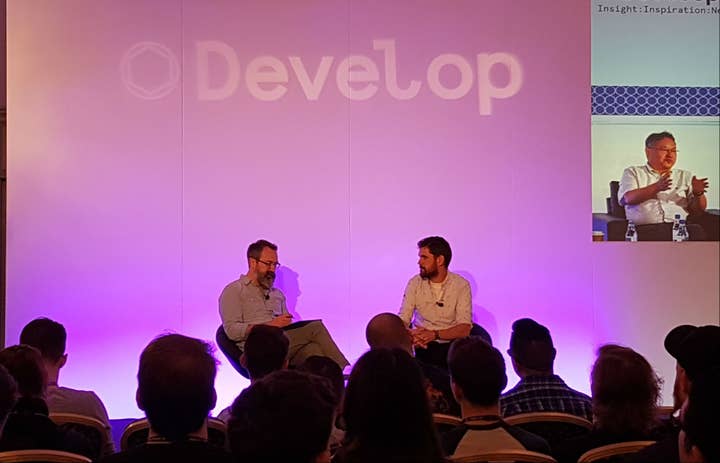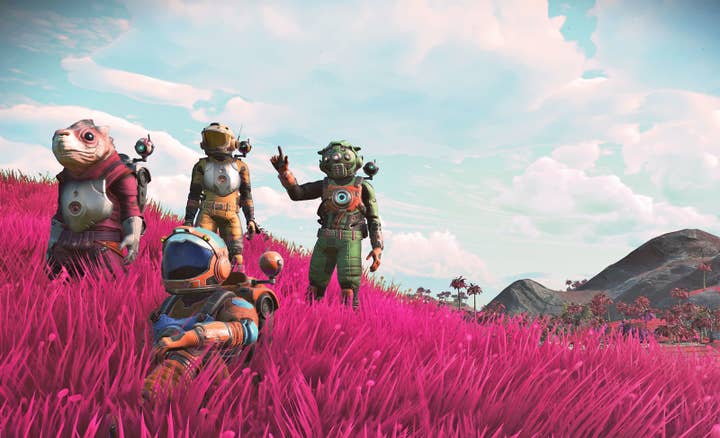Hello Games: Positive No Man's Sky stories "don't do as well -- and that's a problem"
At Develop:Brighton, Sean Murray discussed his decision to stop talking to the press after the launch of No Man's Sky
At Develop:Brighton today, Hello Games' Sean Murray detailed the studio's retreat from talking with the press, and the growing reluctance of many developers to speak honestly about making games in the media.
Speaking onstage with Edge editor Nathan Brown, Murray detailed the creation of No Man's Sky -- and the famously volatile reaction that greeted the game when it launched. As Murray explained to GamesIndustry.biz in a recent interview, the small team at Hello Games wasn't prepared for how their words leading up to release were being received.
"You don't realise as a developer that you're talking to millions of people when you do something like E3," he said. "And most people who buy your game have only ever seen one video, and they've probably only seen 30 seconds of it.
"It kind of kills me that we don't see that much of that any more... where people talk freely and educate people about game development and how it works"
"It's very hard to tell the difference between you talking excitedly about the game, because you are excited and the people you're talking to are excited... And you're talking about development, and that's what we're all used to doing."
Murray suggested a disconnect between the journalists that developers talk to -- who are generally well versed in the industry and the way games are made -- and the people who are likely to buy the finished product.
"In our heads, we always think -- and still do -- when I'm talking to press I feel like, well, I'm talking to you, who completely understands how game development works."
Murray added: "It kind of kills me that we don't see that much of that any more, in terms of journalism these days -- in terms of games journalism, where people talk freely and educate people about game development and how it works and what's going on behind the scenes.
"There's a disconnect there... Clearly, to us, it's obvious that some features are working, and some aren't, and some things we tend to do work out and some things don't. We've cut out this feature and put this other cool one back in... We're just going back and forth like that as, again, just a handful of people making our game."
"And not talking to the press is easy, because I don't really enjoy it"
This difference in understanding contributed to the situation Hello Games faced with No Man's Sky, which was the subject of great frustration from a loud and vitriolic minority of its players. Murray described it as "a unique set of circumstances, to have wanted to make something since you were a kid, then to make that thing and go through the craziness of this really polarised audience that we have now."
Ultimately, the experience changed the way Hello Games thought about communication. The biggest difference was a total blackout with the press, which lasted for around two years before Murray gave a small handful of interviews. But the company also reassessed how it spoke to its community, and the best way to create a dialogue with the people who actually played No Man's Sky.
"I sat down so many times to write the perfect blog post, that was going to explain everything about the development, and where we were, and our road-map for the future -- I did that so many times," he said. "But I could see that it didn't hold credibility, for right or wrong."

It was three months before Hello Games broke the silence with its community, and since then it has focused all communication on patch notes and updates -- with virtually no contact with the press. At that time, Murray pointed out, it was the very start of the "craziness of this really polarised audience that we have now," and there was no established wisdom to refer to. Many games have been greeted with a similar reaction since, however, and Murray stated that he felt vindicated by what followed.
"I can see EA or Microsoft or whoever try to placate players by talking to them, and for right or wrong it just doesn't really work"
"And I can see EA or Microsoft or whoever try to placate players by talking to them, and for right or wrong it just doesn't really work," he said. "We probably did the right thing.
"And not talking to the press is easy, because I don't really enjoy it... It's not a thing I got into games to do, and I don't think I'm particularly good at it, so it was kind of an easy answer there. I'm never sure whether it was the right thing, or it just really appealed.
"I think the reason for not talking to the press was, a bunch of the press when I was growing up was kind of the [hub] of the community. What they wrote, I would read, and as a kid I would think those things -- I would just be led by what that journalist had said, and that would play a huge part in my ability to critique games and think about how games are made."
Indeed, Murray partly attributed his career in games to magazines like Edge, which were where he first became aware of the various disciplines involved in development, and the concept of a career in the industry first started to take shape. The role the games press plays now, though, is different.
"That would lead my thought process, and tell me how to feel about development, and how to feel about games. I don't think that happens as much now. I think that the problem with what we see on front pages being led by what we click on means that naturally you tend to read what the most people clicked... which means the press is naturally downstream from the community."
Murray noted that there were positive stories about No Man's Sky even right after launch, "but they just don't do as well -- and that's a problem." It prompted Hello Games to look past the press as a way to address its issues, and focus on the "real purity" of speaking to its players through the game.
"If you want to communicate with [the community], then you've got to do an update, you've got to release something," he said. "It's a really brilliant thing, and it starts to inform your thinking. How quickly can we get an update out? What can be in it, and what do we want to say with this? It's a weird way of thinking, but it's a nice way of thinking."
GamesIndustry.biz is a media partner for Develop:Brighton 2019 and attended with the help of the organisers

